#democractic socialist
Text
In 1920, the Communist Party of Australia was formed and in 1931 we were the first party to commit to indigenous rights which were included in the manifesto.
The party was banned breifly in 1940 and again in 1950 an attempt to ban it was made but in 1951, a referendum was held and the right to exist as a communist party was won by the vote. The party also changed its name breifly to Australian Communist Party between 1944 and 1951.
The first split occurred in 1961 with the formation of CPA-ML when Ted Hill was expelled from the CPA for supporting the Communist Party of China during the Sino-Soviet split, believing that the CPA had abandoned Marxist Leninist Principles.
Though CPA-ML take an anti China stance now.
The CPA continued to criticise soviet communism and eventually adopted democratic socialism/eurocommunism and abandoned Marxist Leninism and the principles of democractic centralism.
So in 1971 a second split occurred and the Socialist Party of Australia was founded by Pat Clancy and Peter Symon. To remain committed to the principles of Marxist Leninism and democratic centralism.
So as we have it we have the original CPA1920, CPA-ML and the SPA1971.
CPA1920 later dissolved in 1991 and the New Left Party was formed and abandoned in 1992. The CPA1920 assets were then absorbed by the SEARCH foundation a not for profit company, a democratic socialist group.
In 1996, the SPA1971 reclaimed Communist Party of Australia as its name as the rightful successor to the CPA1920.
So now we have CPA 1971 and CPA-ML.
A third split occurred in 2019 when the resigned CPA general secretary Bob Briton formed the ACP in response to internal and personal conflicts within the party.
The Communist Party of Australia remains committed to the principles of Marxist Leninism and democratic centralism. We hold strong fraternal relations with prominent Communist Parties around the world and affiliated with the International Meeting of Communist and Workers Parties. Our goal is a revolutionary transformation of society and to establish socialism in Australia
18 notes
·
View notes
Text
STOP electing these democrat & mentally sick and deranged RINOS & liberal left communists & RINOS people:
They are Actuvely Pro the following:
1. Anti you
2. Pro drag indoctrination action of children
3. Anti religion
4. Anti God
5. Pro trans
6. Pro sick same sex marriage
7. Anti women
8.Anti white
9.Anti Democractic
10.Anti Constitution
11.Racists in nature
12.Anti proper education of basics
13.Anti Jesus Christ
14.Anti semetists
15.Pro socialist Communists
IS THIS WHAT YOU WANT PEOPLE?
I DO NOT THINK SO, DO NOT ELECT ANY DEMOCRATS/RINOS AT ANY LEVEL OF GOVERNMENT -CITY/STATE/ and certainly not FEDERAL IN ANY ELECTION CYCLE & reject ALL LOCAL PROPOSALS
0 notes
Text


the timeline is fucked
#roe v wade#greg abbott#texas#abortion law#abortion rights#covid#regeneron#fetus#fetal cells#equality#republican#conservative#democratic#democrat#liberal#neoliberal#socialist#socialism#democract socialism#communism#fascist#Fascism#feminist#feminism#texas law#pro vaccine#pro choice#vaccinate
2K notes
·
View notes
Text
The fact that so many of you profess to have radical politics but have no idea what they mean in relation to actual political theory is laughable.
#You are not a socialist you are not a democractic socialist you are a normie progressive liberal.#Read a book for a change.
5 notes
·
View notes
Photo
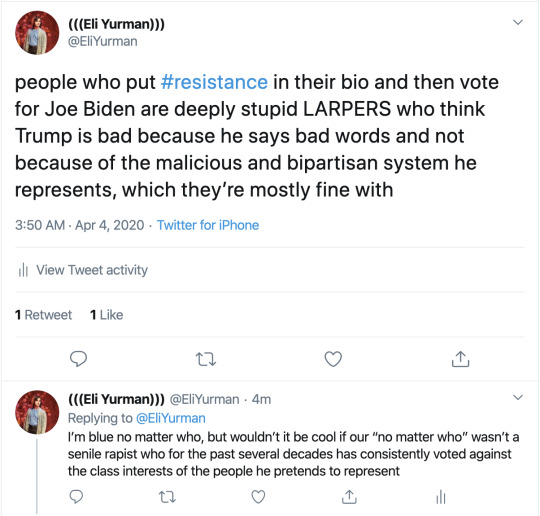
4am in quarantine means it’s time to be angry about politics
anyway follow me on twitter
#politics#american politics#trump#biden#2020 election#primaries#democracts#republicans#socialism#socialist#leftist#leftism#fascism#bernie sanders#donald trump#joe biden#twitter#.txt#eli irl
16 notes
·
View notes
Text
The problem (well, one of many) with cherrypicking someone's writing to try and showcase how they are some problematic person guilty of X is that it is often not that hard to dig into their back catalogue of writing and cherrypick examples that prove the exact opposite.
I mean, you could no doubt cherrypick the things I've written to prove I'm a Libertarian Jehovah's Witness, with a little work.
#I'm a Democractic Socialist Atheist#ftr#Just little Fandom Things#You can't use someone's writing to determine their IRL views#Musings#Just little writer Things
2 notes
·
View notes
Photo
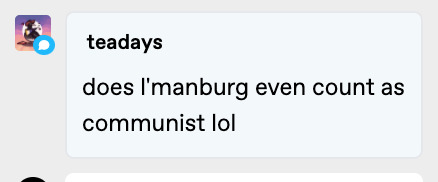
actually it sorta was, but only at some points during its existence. L’manberg has gone through a lot of leaders with wildly different political ideologies
- it was an autocracy/semi-monarchy from its founding up until the election, lead by wilbur soot. political leaning not defined but u could call it socialist/communist since theres no wealth classes and resources were shared
- it was a democracy during the election to prevent future problems with people being mad wilbur wasnt a democractically elected leader. cant count this in officially though as it was moreso a front wilbur put up in his confidence that he’d be re-elected and assumed the country would go back to being an autocracy (LMAOOOOO)
- it was a authoritarian socialist dictatorship under the jschlatt administration. socialist in its economy, extremely authoritatian with how it monitored, punished, and controlled its citizens (the suits becoming a mandatory outfit being a good example). Jschlatt on several occasions calling himself the emperor as well
- and i think it was a liberal democracy up until Doomsday under Tubbo’s rule. tubbo and his cabinet being chosen by his people and noteably being the only leader of L’manberg who wasnt in an all powerful position of leadership (wilburs autocracy/monarchy & Schlatt’s dictatorship)
so yeah uuuuh i guess? im not the most educated on politics but from what i know/what the wiki says were their official political ideologies during certain eras, L’manberg seems to have been a socialist country for the majority of its existence! not quite communist in the sense that it still had a goverment tho, it blew up before that could happen (thanks wilbur and techno, very cool.)
#the bee speaks#i guess u could count the server as a whole as communist now tho cuz the majority of the server doesnt belong to a country anymore#and they dont have goverment or social classes based on wealth#DONT TAKE MY WORD ON ALL OF THIS THO. im for sure wrong in a few parts cuz sometimes distinguishing different political#leanings and ideologies is fucking HARD and the majority of things that decide stuff like that is missing on dreamsmp due to it being#funny block game and not like. an actual country so i cant rlly use lmanbergs economics as any reference or anything
19 notes
·
View notes
Text
i’m so mad i can’t see straight but three things:
climate change is scientifically backed, a serious problem, and something you should care about even if you are an evangelical christian who believes it’s just a sign of the rapture, just in the off case you’re wrong and you actually want your grandchildren to not be living in a mad max hellscape
there is nothing wrong with being lgbtqia+. children and teenagers who believe they are some shade of gay or trans are not crazy, and their parents are not buying into their “hysteria” by being supportive or allowing them to identify and dress how they want. also, while i do agree that any permanent changes should be greatly discussed and waited on (because gender and sexuality are fluid), there is absolutely nothing wrong with kids exploring their identities as young as elementary school. short hair can grow back, different clothes can be bought, hormone inhibitors are (iirc, don’t quote me i’m not a professional) reversable.
jesus’ teachings line up far more with bernie sanders’ scary “cOmMuNiSt” (democractic socialist but the boot is so far in their mouths i’m scared they’ll choke) ideals than any goddamn thing trump has ever said. the story is “jesus feeds the five thousand” not “jesus hoards the five loaves and two fish because everyone else is a welfare queen.”
#i hate my parents’ pastor so much. can’t wait for him to keel over or retire.#text#ex christian#deconversion#doomsday for ts#anti evangelical
102 notes
·
View notes
Text
9/15/2020
https://www.gocomics.com/bobgorrell/2020/09/15
Grade: F
Actual Drawings 2019: 12.5/114(10.9%)
Background drawings 2019: (1/114)
17 gradients 4 photoshop brush/texture 14 photo backgrounds
Holding piece of paper count 2020: (24/114)
11 cartoons since last drawing
Trump button

Biden President logo
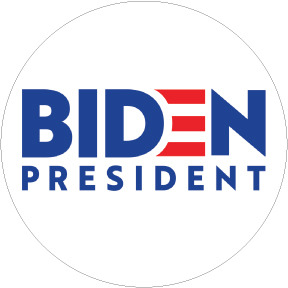
The Democrats continue to fall into the republican trap of running in the center. The argument against Sanders and Warren was “it’ll alienate ‘moderate’ republicans!”, so Democracts nominated the candidate closest to the center, and still it isn’t good enough for Gorrell.
Gorrell likes to make it seem like there could be a Democrat that he and his fellow republicans would vote for instead of Trump. But there isn’t one.
Even if the democrats had nominated Mitt Romney and John Kasich, the right would still call them radical socialists.
Trump is running as a fascist, and his most dangerous trait he’s able to convince people that he’s just joking when he says something dangerous like “we’re going to negotiate for a 3rd term”
1 note
·
View note
Text
“ alle, zusammen, gegen den Faschismus” (all, together against facism)
That's heavy. It's a political quake.
There is a step happening here that has been similar in german history 1933. As soon as conservative parties ally themselves with extreme right-wing parties, just for the sake of power, then things look bad for democratic forces. The main thing is to prevent the socialist parties, like SPD, Die Linke and the Greens, the FDP and the CDU prefer a pact with the devil. They have made themselves a tool of the AFD, a extrem right-wing party. That is highly dangerous. And parallels to the USA (this non impeachment... it is heartbreaking) and Brexit are obvious. All german and eu parties must pull themselves together and uphold democratic values - with a common strategy. The frightening: the conservatives CDU and the liberals FDP are so stupid to let themselves be lured onto the podium by the extreme right-wing AFD because they are power-hungry. This greed is already part of the AFD's strategy. The Afd is instrumentalising these parties, which apparently throw democratic values overboard for their hunger for power. They are democratically elected, by fascists. Germany has learned nothing from its history. It didn’t have to stay that way. All those who stand by democractic values are now on demand. Don’t give up. We can do better.
#germany#thueringen#electronics#democracy#democracy in danger#berlin#fdp#brexit#nonimpeachment#rejectthecoverup#impeachment
6 notes
·
View notes
Text

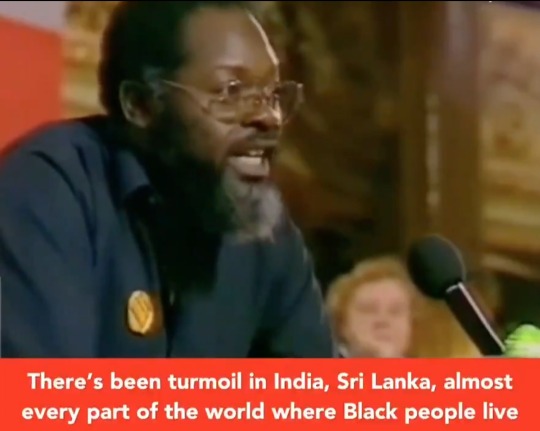
Bernie Grant continued-
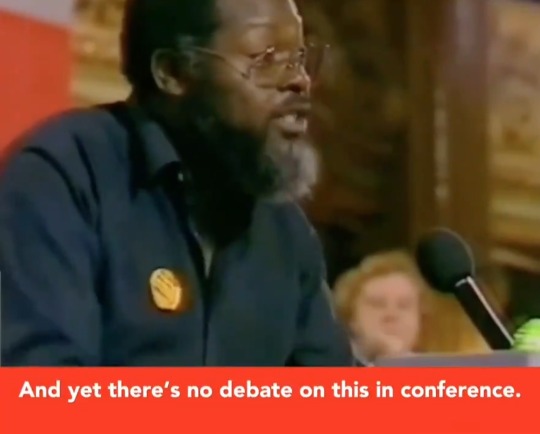
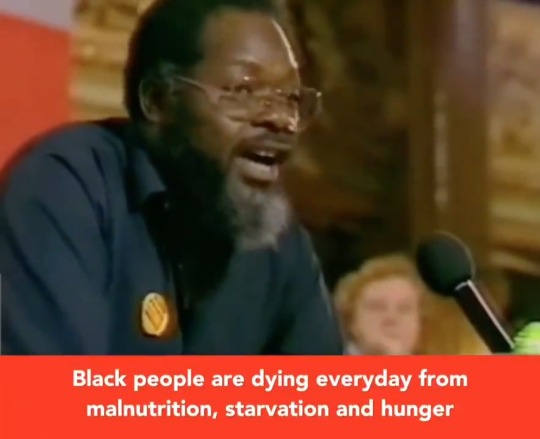
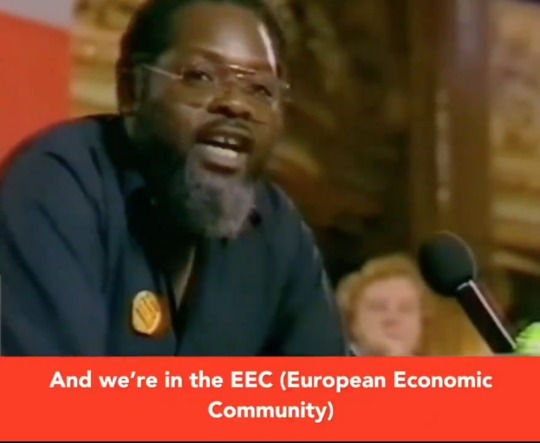
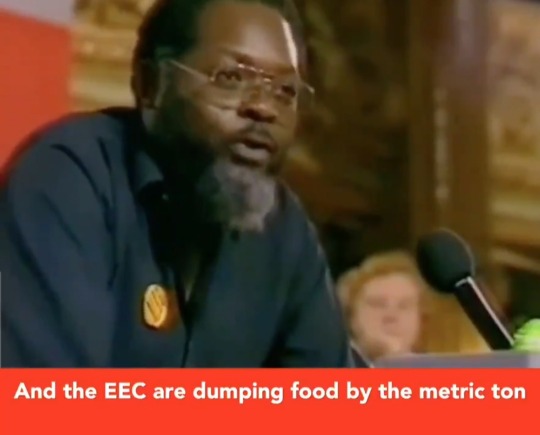
https://youtu.be/FLVIXAkmFCs
In light of the new leader of the labour party being elected i feel firmly secure that party politics will continually be inadqeuate at addressing the structural and interpersonal racism of britain which lurks in any conceivable crevice. Any meaningful attempt at a very light anti-racist social democractic (not even really super socialist) party guidance was thwarted at every turn!!!
So i welcome the radical politx of the 2020z and again begin tonconeptualise the very meaning of politics in the face of such monumental societal breakdown (climatechange)
youtube
1 note
·
View note
Text
one the thing that’s good about the rising popularity and membership of socialism and socialist orgs is that the bureaucrats and organizers and workers speaking publicly about socialism no longer permit the right wing and the third way liberals to fear monger about the spectre of socialism. there’s no spectre. there’s easy to relate to people out there speaking plainly about the goals of a kind of socialism. so now we’ll see what happens next. i believe it’s going to be the democracts fully embracing a regressive moderation in approaching reformism by focusing on traditions in capitalist democracy and trying to sound idealist. republicans will just laugh, guffaw, and play overt hater. i dunno.
28 notes
·
View notes
Link
via Politics – FiveThirtyEight
Welcome to FiveThirtyEight’s politics chat. The transcript below has been lightly edited.
sarah (Sarah Frostenson, politics editor): On Wednesday, a mob of pro-Trump rioters attacked the U.S. Capitol as Congress met to certify the 2020 presidential election results. But as shocking as Wednesday’s events were, they were, in many ways, the culmination of the past four years of Trump’s presidency.
President Trump has long spewed lies to his supporters about the election, refusing until very recently to concede, and routinely has shown his disdain for both the integrity of America’s elections and its tradition of a peaceful transfer of power. And right before the chaos broke out on Wednesday, Trump had just finished urging his supporters to protest Congress’s vote to certify the election results, telling them “[Y]ou’ll never take back our country with weakness. You have to show strength and you have to be strong.” Within an hour, the Capitol was under attack.
This violent episode raises many questions about the future of democracy in America — not only its continued health, but the extent to which the U.S. has already become less democratic. So let’s first unpack this question by diving into this data point: Polls show while the majority of Americans condemn what happened on Wednesday, a plurality of Republican voters support it. What does that say about the current state of democracy in the U.S.?
jennifer.mccoy (Jennifer McCoy, professor of political science at Georgia State University): It shows that Americans are terribly divided over the perception of democracy itself — including whether it is even under threat and who is responsible for the threat. This makes it extremely difficult to propose solutions. But it’s important to keep in mind that we’re talking about 15 percent of the population, maybe 20 percent, who said they condoned the violence.
lee.drutman (Lee Drutman, senior fellow at New America and FiveThirtyEight contributor): Democracy requires parties that are committed to free and fair elections and will accept the outcome — even if they lose. So if the dominant position in the Republican Party is that the only free and fair elections are those where Republicans win, and anything else is “stolen” and fraudulent, then we’re on the precipice of not having a democracy.
But as Jennifer said, the one silver lining here is that the overwhelming majority of Americans reject the anti-democratic rhetoric of Trump and his allies. This is important.
cyrus.samii (Cyrus Samii, professor of politics at New York University): I find it helpful to place this moment in a broader historical context, as I think there are two trends at play here. First, decades of mobilization and a fight for a more democractic, inclusive society have brought about generational changes in America’s politics, including more women, people of color and other long-excluded groups now having a seat at the table. That has made our politics more inclusive and more democratic, but there is a second trend here — a politics of resentment that cannot tolerate this growing diversity. This mindset is particularly rampant within the Republican Party, and part of what CNN’s Van Jones has called a “whitelash,” or conservative white Christian Americans mobilizing against the type of progress embodied by President Barack Obama’s time in office. The Atlantic’s Adam Serwer has also written on the pendulum swinging between moments of progress on inclusion and white resistance.
Last Wednesday embodied this dynamic in the span of a few hours: We had the historic election of two Democratic senators in Georgia, followed then by a mob, including a number of white supremacists sacking the Capitol in the name of Trump, and most Republicans to date being unwilling to do much about it.
jennifer.mccoy: Yes, and I think the question now is whether this unwillingness to condemn the mob, or call out their colleagues who are perpetuating the myth of a “stolen election,” is the dominant position in the Republican Party or only a faction that can be contained.
sarah: Do we have a sense of what is driving these attitudes?
jennifer.mccoy: The politics of resentment, written about by a number of scholars, including Kathy Cramer and Arlie Hochschild, who wrote definitive books on the topic, derives from perceptions of unfairness or injustice that accompany the diversification of one’s workplace or community, changing the power structures that Cyrus spoke about. The urban-rural divide in America’s politics exemplifies this. Rural Americans, mostly Republicans, perceive urban dwellers, more Democratic and more racially diverse, as receiving more than their “fair share” of tax revenues and opportunities. With wage stagnation and the growing service-based economy, white males without a college degree, in particular, feel a loss of social status that can lead to rage and support for more authoritarian politics. This is why “identity politics” are arguably more of an issue for the GOP than the Democratic Party today. What’s particularly troubling here, though, is that the political rhetoric from politicians and media personalities are really whipping up latent attitudes of resentment to create the politics of outrage we saw on display last Wednesday. Republicans have gone further than Democrats in using vilifying language and painting horrific scenarios if the “radical, liberal, socialist Democrats” and their “anarchic mobs” take over.
lee.drutman: To follow up on Jennifer’s point about politicians driving some of this, take what Vice President Mike Pence said at the Republican National Convention this summer. He said that the election was about “whether America remains America.” Those are incredibly high stakes, so when you add that kind of rhetoric to our winner-take-all election system, you have a recipe for a very angry minority convinced that the system is rigged against them. As we saw last Wednesday, one response is to take matters into their own hands through violence.
We also know that opposition to democracy is much stronger among Republicans who have beliefs that political scientist Larry Bartels has called “ethnic antagonism,” a measure of “unfavorable feelings towards Muslims, immigrants and other out-groups … [and] concerns about these groups’ political and social claims” in his research.
The chart below is extremely striking as it shows that among Republicans, the higher the level of ethnic antagonism, the more likely they are to say they don’t trust election results, use force as an alternative and support authoritarian stances. (Bartels “normalizes” the distribution so that half of Republicans are above zero on the ethnic antagonism scale, and then presents the data two ways — using statistical analysis to estimate values (left) and reporting the actual data in the limited survey sample (right).) Overall, though, the takeaway is clear: Bartels finds troublingly high support for these sentiments among Republicans.
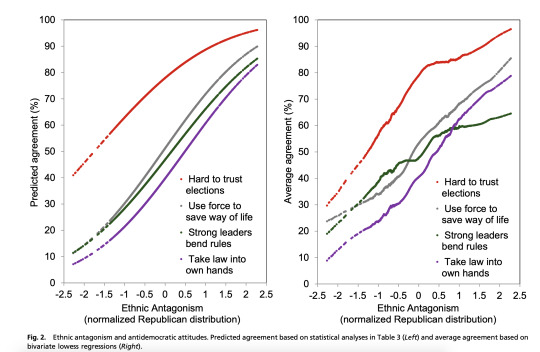
sarah: Is what happened Wednesday, then, a somewhat expected consequence of what happens when a sizable portion of the electorate loses faith in our elections and institutions?
jennifer.mccoy: To be clear, the research we have doesn’t necessarily show that losing faith in elections and institutions leads to violence. It can, for instance, have repercussions like withdrawal and political apathy. We saw this in Venezuela when the opposition cried fraud, without evidence, after losing a referendum to remove President Hugo Chávez in 2004. They had trouble turning out supporters in governor elections right after, and then called for a boycott in the 2005 legislative elections, handing total control to Chávez’s party and enabling them to name loyalists to all of Venezuela’s political institutions. It took another decade before Venezuelans could mobilize to win back the legislature, but by that time, Chávez’s successor had turned even more authoritarian and remains in power today.
However, if political rhetoric is drumming up violence, using demonizing and dehumanizing language and glorifying battle language, then yes, supporters are likely to engage in violence, thinking their leaders are urging that, as we saw last Wednesday.
lee.drutman: Jennifer’s point about political rhetoric is extremely important. The level of nativism, or anti-immigration sentiment, has been roughly consistent in the population for a while now. But there are signs that it has become a much stronger partisan issue in the last decade or so as Trump and other Republicans have played with rhetorical fire. It’s true that far-right leaders have been stoking this issue in multiple western democracies, and as the chart below shows, it’s evident among Republicans in the U.S.
jennifer.mccoy: And the future of the Republican Party is absolutely key to what happens to U.S. democracy. Early signs after Jan. 6 are not encouraging — the party reelected Trump’s hand-picked candidates for the RNC, chair Ronna McDaniel and co-chair Tommy Hicks, and many party leaders have also avoided calling for any accountability for Trump, instead saying that this will further divide the country when we need to unify.
sarah: Some historians have argued if there isn’t accountability, this will all escalate. Is that accurate? How are you all thinking about the importance of consequences for what happened Wednesday for democracy moving forward?
Historian of coups and right-wing authoritarians here. If there are not severe consequences for every lawmaker & Trump govt official who backed this, every member of the Capitol Police who collaborated with them, this "strategy of disruption" will escalate in 2021
— Ruth Ben-Ghiat (@ruthbenghiat) January 7, 2021
cyrus.samii: If there is no accountability, then the lesson for Republicans will be that they can continue to use illiberal means to maintain a grip on power. And on the left, this might play into the hands of those who would say there is no point in sticking with liberal institutional processes when the other side doesn’t. A clear recipe, in other words, for escalation.
jennifer.mccoy: And if there isn’t any accountability for what happened Wednesday, it gives organized citizens, as well as the next generation of political leaders, license to engage in the same — or worse. Political learning is a real thing, and it can be positive or negative.
If Congress or others fail to act, the road remains open to Trump (and anyone else) to continue to act with impunity, run for office again or support future violent acts. Congress has the ability to impeach Trump and take the extra step of disqualifying him from running again, and the power to censure and even expel the members of Congress who spread the same disinformation about the election and voted against the certification of results in two states. This is important because failing to condemn the exclusionary and hate-filled rhetoric Trump used in his presidency means that catering to the fears, anxieties and resentments of a portion of the electorate might remain a viable political path moving forward.
sarah: Let’s take a step back. In November, The New Yorker’s Andrew Marantz wrote a feature on how civil resistance can stop authoritarian-style leaders from cementing their power, comparing what’s happened in the U.S. under Trump to other parts of the world. “In the past 15 years, there has been a marked global increase in what international relations scholars call ‘democratic backsliding,’” wrote Marantz, “with more authoritarians and authoritarian-style leaders consolidating power.” To what extent is there democratic backsliding in the U.S.?
lee.drutman: If democracy depends on a set of shared rules for free and fair elections, we are definitely in a period of backsliding.
cyrus.samii: I don’t know, the term “democratic backsliding” is problematic in my opinion insofar as it fails to clarify how the conflict in the U.S. is between those using democratic means to achieve progressive change (and succeeding at some moments) versus those who want to push back against that change by undermining democracy. The fact is, a lot of progress is occurring through the ballot box, the U.S. Senate runoffs in Georgia being a prime example, and this is precisely why Republicans are intent on throwing up obstacles to its broad-based use. Republicans have been trying to disenfranchise minority voters, for example, and these efforts are subject to heated legal fights.
sarah: So as Cyrus said, democratic backsliding may be too toothless of a term, but how would we describe the trajectory of democracy in the U.S.? Are we less democratic than one year ago? Four years ago?
jennifer.mccoy: According to international rankings, U.S. democracy is eroding faster than what we see in other major western democracies — it is more on par with Brazil, Bangladesh, Turkey and India, according to the global think tank V-Dem Institute’s 2020 democracy report. The Economist Intelligence Unit also downgraded the U.S. to a flawed democracy in 2016. Expert surveys of political scientists, such as Bright Line Watch and Authoritarian Warning Survey, also measure higher threats.
Each of these groups measure democracy using different measures — electoral integrity, rule of law, media and academic freedom, civil liberties, to name a few. But one measure I want to zoom in on is “toxic polarization” (which I call “pernicious polarization” in my research with Murat Somer), as we’ve found it’s especially delegitimizing and on the rise. Essentially, it’s when society is divided into two mutually distrustful camps and there is increased demonization and delegitimization of opponents. Our research has found that it can often result in calls to violence, too.
It’s also something V-Dem uses in its assessments. It found in a 2020 paper that the Republican Party was on par with autocratic parties in Turkey, India and Hungary on their new illiberalism index, especially in their use of demonizing language to describe political opponents, disrespect for fundamental minority rights and encouragement of political violence.
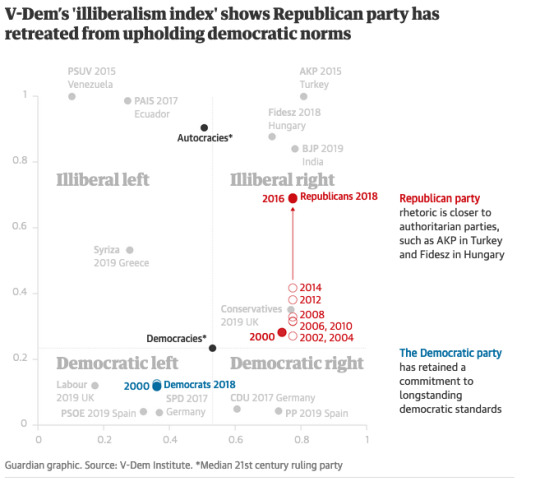
lee.drutman: (If you’re interested in how these various surveys evaluate the quality of a country’s democracy, here’s a great paper that outlines the different ways they measure democracy — summary table below.)
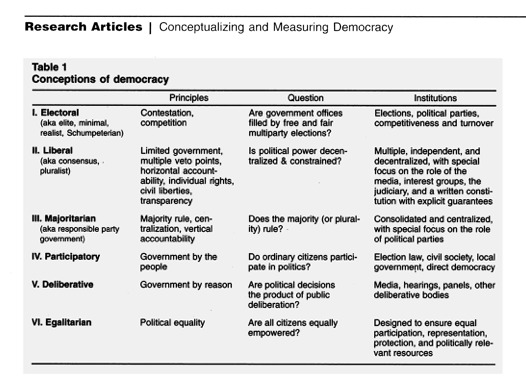
sarah: It’s true that in survey after survey, Republicans, as you all have said, have expressed less support for democracy than Democrats, but I was hoping we could unpack a little more the debilitating effect that this has had on American democracy writ large.
For instance, in the wake of the protests in Portland, Oregon, last summer, FiveThirtyEight’s Maggie Koerth and contributor Shom Mazumder found evidence of members of both parties holding anti-democratic views.

As the chart illustrates, this was especially true among Republicans, so I’m not trying to “both sides” this, but I do want to unpack the effect that severe polarization might have on democratic erosion. That is, how do you factor in polarization when looking at how the U.S. has become less democratic? Is it the number one factor driving what we’re seeing? Or is that too simplistic?
cyrus.samii: Breakdown by party is exactly the right way to look at it. Democrats are involved in a bottom-up struggle to broaden political inclusion while Republicans have been fighting to limit that, including in this past year’s elections. And so it is not so much a question of democratic backsliding at the country level, but rather in terms of whether parties see themselves as being competitive democratically or whether they need to use anti-democratic strategies to maintain their grip.
lee.drutman: Jennifer’s work on pernicious polarization is incredibly important here, and has really influenced my thinking. When politics becomes deeply divided in a binary way along cultural and identity lines (as it is now in the U.S.), democracy is in a really dangerous place.
jennifer.mccoy: And this type of polarization is more likely to lead to democratic erosion because it is based on an “us vs. them” division, not just disagreement on issues.
lee.drutman: On that chart, Sarah, showing support for strong leader/army rule, I’ve co-authored two recent reports on the topic, one in 2018 and another in 2020. And it’s true, we did find some support for these alternatives to democracy on both sides, which is worrying. But again, the overwhelming majority of Americans are in support of democratic institutions.

But here is where political leadership is so important. That some voters have weak connections to democracy is not a new problem. In fact, research has found that is typical among those who are the least educated and least politically engaged. The new problem is having political leadership that encourages and stokes these anti-democratic sentiments.
jennifer.mccoy: And as partisan antipathy grows, perceptions of out-party threat grow, and that leads people to challenge democratic norms so as to keep their own party in power and keep the others out.
cyrus.samii: The way I interpret the question, Sarah, is: How does polarization affect Republicans’ thinking on whether or not to abandon the strategy of limiting democratic processes to retain their hold on power, rather than seeking new coalitions, broadening their appeal and making themselves more competitive democratically?
In other words, it’s all about the strategy that the Republicans pursue. So when you take that into consideration, increased polarization — by which I mean distancing oneself from and dehumanizing outgroups — could sustain Republicans’ fixation on limiting democracy because they cannot see themselves forming any new alliances with people outside their traditional white Christian base.
lee.drutman: Cyrus — that is the central question, but I think there is a significant division among Republicans. So let me reframe your question slightly: What will it take for Republicans who want to build a more inclusive, pro-democracy party to triumph over those who are committed to ethnonationalism and grievance?
cyrus.samii: Yes, Lee, exactly.
lee.drutman: And as long as we think of this as a zero-sum Democrats vs. Republicans fight, we’re stuck. But if we think of this in terms of the forces of democracy vs. the forces of ethnonationalism (or whatever you want to call it), I do think we can make some progress.
sarah: Are there institutional changes (abolishing the Electoral College, reforming the Senate, etc.) that would bolster American democracy or make it less vulnerable to similar challenges in the future?
lee.drutman: I’ve written a lot about what would happen if the U.S. moved to a more proportional voting system, and I do think that would enable a center-right party to operate independent of a far-right party. It also might allow for a broader governing coalition that could keep the far-right out of government, as has happened in many Western democracies with more proportional voting systems.
And maybe we see this play out a little in the U.S. That is, I could see a pro-democracy faction within the Republican Party joining with Democrats to support electoral reforms (such as the Fair Representation Act, a piece of election reform legislation that would establish multi-member districts with ranked-choice voting).
cyrus.samii: Institutional changes to the Electoral College or the Senate would certainly make a difference, since those institutions are a part of what Republicans currently rely on in the anti-democractic aspects of their strategy. But changing them is probably too hard, politically.
Of course, once, say, Texas goes blue, those institutions will come to have the opposite effect and lock out Republicans — unless they change who they can attract. Also, Sarah, I think the idea that “overall trends point to increased illiberalism” is only true when it comes to the kinds of strategies that Republicans are using to try to maintain a grip on their power, rather than with respect to U.S. democratic politics as a whole.
lee.drutman: Yes, changing the Electoral College or the Senate would require constitutional amendments. Enacting proportional representation, interestingly enough, is entirely within Congress’s power, though.
jennifer.mccoy: I want to go back to an earlier point about HOW we get here. I’ve written with Somer about how democracies could solve this dilemma by “repolarizing” along democratic lines vs. authoritarian lines, and what we found is very similar to Lee’s and Cyrus’s point about inclusive movements vs. exclusionary ethnonationalist movements. That is, shifting the axes of polarization to the principle of protecting democracy instead of a divide between different partisan and social identities could actually help protect democracy, as long as it’s not done with demonizing or hyperbolic language.
And that’s important, because as political scientist Daniel Ziblatt has written, a principled conservative or center-right party is essential for a functioning democracy. Even President-elect Joe Biden has reiterated the need for a Republican Party for the health of our democracy. The problem is our two-party system is currently mired in toxic polarization and so the extreme elements within the parties are amplified. We need institutional reforms to allow for political incentives to change.
lee.drutman: I do think the events of Jan. 6 have been a tremendous wake-up call to many on the urgency of democracy reform.
cyrus.samii: It certainly was a wake-up call, Lee. I also think that the incredibly tumultuous times that current 18- to 35-year-olds have endured — 9/11, the Iraq War, the Great Recession, Trump’s presidency, the events that inspired the Black Lives Matter protests this summer, and of course, COVID-19 — could generate a political consciousness that we haven’t seen since the 1960s or 70s.
lee.drutman: Cyrus — yes, there are lots of similarities to the Great Society Era which was the last era of major democracy reform and included major voting rights reform. There are also lots of similarities to the Progressive Era, which was the previous era of large-scale democracy reform.
So if you believe in political scientist Samuel Huntington’s theory that there is a 60-year cycle of democracy reform movements — that every six decades or so, American democracy falls short of its democratic ideals and reform movements emerge to expand our democracy, we’re right on schedule.
1 note
·
View note
Quote
Theoretically ‘democracy’ means popular government; government by all for everybody by the efforts of all. In a democracy the people must be able to say what they want, to nominate the executors of their wishes, to monitor their performance and remove them when they see fit.
Naturally this presumes that all the individuals that make up a people are able to form an opinion and express it on all the subjects that interest them. It implies that everyone is politically and economically independent and therefore no-one, to live, would be obliged to submit to the will of others.
If classes and individuals exist that are deprived of the means of production and therefore dependent on others with a monopoly over those means, the so-called democratic system can only be a lie, and one which serves to deceive the mass of the people and keep them docile with an outward show of sovereignty, while the rule of the privileged and dominant class is in fact salvaged and consolidated. Such is democracy and such it always has been in a capitalist structure, whatever form it takes, from constitutional monarchy to so-called direct rule.
There could be no such thing as a democracy, a government of the people, other than in a socialistic regime, when the means of production and of living are socialised and the right of all to intervene in the running of public affairs is based on and guaranteed by the economic independence of every person. In this case it would seem that the democratic system was the one best able to guarantee justice and to harmonise individual independence with the necessities of life in society. And so it seemed, more or less clearly, to those who, in the era of the absolute monarchs, fought, suffered and died for freedom.
But for the fact that, looking at things as they really are, the government of all the people turns out to be an impossibility, owing to the fact that the individuals who make up the people have differing opinions and desires and it never, or almost never happens, that on any one question or problem all can be in agreement. Therefore the ‘government of all the people’, if we have to have government, can at best be only the government of the majority. And the democrats, whether socialists or not, are willing to agree. They add, it is true, that one must respect minority rights; but since it is the majority that decides what these rights are, as a result minorities only have the right to do what the majority wants and allows. The only limit to the will of the majority would be the resistance which the minorities know and can put up. This means that there would always be a social struggle, in which a part of the members, albeit the majority, has the right to impose its own will on the others, yoking the efforts of all to their own ends.
And here I would make an aside to show how, based on reasoning backed by the evidence of past and present events, it is not even true that where there is government, namely authority, that authority resides in the majority and how in reality every ‘democracy’ has been, is and must be nothing short of an ‘oligarchy’ — a government of the few, a dictatorship. But, for the purposes of this article, I prefer to err on the side of the democrats and assume that there can really be a true and sincere majority government.
Government means the right to make the law and to impose it on everyone by force: without a police force there is no government.
Now, can a society live and progress peacefully for the greater good of all, can it gradually adapt to ever-changing circumstances if the majority has the right and the means to impose its will by force on the recalcitrant minorities?
The majority is, by definition, backward, conservative, enemy of the new, sluggish in thought and deed and at the same time impulsive, immoderate, suggestible, facile in its enthusiasms and irrational fears. Every new idea stems from one or a few individuals, is accepted, if viable, by a more or less sizeable minority and wins over the majority, if ever, only after it has been superseded by new ideas and new needs and has already become outdated and rather an obstacle, rather than a spur to progress.
But do we, then, want a minority government?
Certainly not. If it is unjust and harmful for a majority to oppress minorities and obstruct progress, it is even more unjust and harmful for a minority to oppress the whole population or impose its own ideas by force which even if they are good ones would excite repugnance and opposition because of the very fact of being imposed.
And then, one must not forget that there are all kinds of different minorities. There are minorities of egoists and villains as there are of fanatics who believe themselves to be possessed of absolute truth and, in perfectly good faith, seek to impose on others what they hold to be the only way to salvation, even if it is simple silliness. There are minorities of reactionaries who seek to turn back the clock and are divided as to the paths and limits of reaction. And there are revolutionary minorities, also divided on the means and ends of revolution and on the direction that social progress should take.
Which minority should take over?
This is a matter of brute force and capacity for intrigue, and the odds that success would fall to the most sincere and most devoted to the general good are not favourable. To conquer power one needs qualities that are not exactly those that are needed to ensure that justice and well-being will triumph in the world.
But I shall here continue to give others the benefit of the doubt and assume that a minority came to power which, among those who aspire to government, I considered the best for its ideas and proposals. I want to assume that the socialists came to power and would add, also the anarchists, if I am not prevented by a contradiction in terms.
This would be the worst of all?
Yes, to win power, whether legally or illegally, one needs to have left by the roadside a large part of one’s ideological baggage and to have got rid of all one’s moral scruples. And then, once in power, the big problem is how to stay there. One needs to create a joint interest in the new state of affairs and attach to those in government a new privileged class, and suppressing any kind of opposition by all possible means. Perhaps in the national interest, but always with freedom-destructive results.
An established government, founded on the passive consensus of the majority and strong in numbers, in tradition and in the sentiment — sometimes sincere — of being in the right, can leave some space to liberty, at least so long as the privileged classes do not feel threatened. A new government, which relies for support only on an often slender minority, is obliged through necessity to be tyrannical.
One need only think what the socialists and communists did when they came to power, either betraying their principles and comrades or by flying colours in the name of socialism and communism.
This is why we are neither for a majority nor for a minority government; neither for democracy not for dictatorship.
We are for the abolition of the gendarme. We are for the freedom of all and for free agreement, which will be there for all when no one has the means to force others, and all are involved in the good running of society. We are for anarchy.
Neither Democracts Nor Dictators: Anarchists - Malatesta
4 notes
·
View notes
Text
IDK like I don’t rly know what my full opinion on the DNC is but like
I don’t....... get how there are so many people on this site complaining that both:
a) the democracts are useless and incompetent
b) the democrats are beholden to donors
like. u guys realise we exist in a capitalistic world, right...? Like if the democrats aren’t appeasing donors how are they gonna have enough money to be a viable 2nd candidate at all......? and did ppl consider that the reason why the dems have it so much harder is that the republicans have like every mega rich person in America on their side and use their wealth to manipulate the media so there’s millions of Americans who get force-fed right-wing propaganda every day...????
like. I just don’t...g et what u expect them to do. Stop accepting money, and just... roll over and let the republicans consign all poor ppl to death or near slavery...?? magically gain the ability to reach millions of Americans on a regular everyday basis and put money into every possible winnable seat based on in-depth statistics, which would normally cost billions of dollars ??? not even mentioning shit like gerrymandering which has made winning a looot seats literally IMPOSSIBLE.
i mean dont get me wrong, im right w you on the corrupting influence of money in politics, capitalism kills,e tc etc., but like......if u have a viable model for how a genuinely left-wing socialist party could fund itself and compete w/ the republican party, then PLEASE share it, because until then ‘a party that can sometimes mediate the worst of the capitalistic impulses of the republicans’ is probably the best that a capitalist system is going to allow probably???
2 notes
·
View notes
Text
The Most Powerful Restaurant Workers in America added to Google Docs
The Most Powerful Restaurant Workers in America
Geoconda Argüello-Kline of the Culinary Workers Union outside during early caucusing
Nevada’s Culinary Workers Union can propel a presidential candidate to victory. As the Nevada caucus approaches, union members consider their options.
Line cooks, food runners, servers, and dishwashers are not often thought of as politically powerful. They struggle with long hours, low pay, and job insecurity, and as shift workers, they’re among the least likely constituents to take time away from work to vote. Retiring from a restaurant job can be equally brutal, if not impossible, even for chefs with celebrated careers. Alexandria Ocasio-Cortez, the U.S. representative and second most famous Democratic Socialist in America, was radicalized while working as a bartender and surviving on tips.
But in Nevada, one of the most powerful organizations in politics is the Culinary Workers Union, which represents hospitality workers across the state. It is renowned for its ability to organize its 60,000 members as a potent force — and to sway elections. Candidates are aggressively courting the union’s support in the 2020 Nevada Democractic Caucus, which takes place February 22, and where early voting is underway.
The line for early voting outside the Culinary Union hall on Saturday
The union’s strength is built on its success at transforming economically precarious food service jobs into foundations of stable middle-class life. It is known for its aggressive organizing tactics and lengthy strikes, and the results speak for themselves. Union wages in Nevada are on average higher than those at non-union companies, and a union-sponsored culinary academy allows workers in lower-paid positions to train for higher-paid ones: A pot washer can train to be a pantry cook, and that pantry cook to become a pastry chef. Feminist victories range from banning the requirement that cocktail waitresses wear heels to panic buttons for hotel room attendants. Workers have a pension fund, and there are programs to help members gain citizenship or purchase a first home. Most vital, for many members — and at the core of a highly publicized dispute with supporters of presidential candidate Bernie Sanders in recent weeks — is the robust health insurance offered by the union.
The Culinary Workers Union is Local 226 of the national union Unite Here (stylized as UNITE HERE), and it represents hotel workers such as guest room attendants, laundry workers, and porters, as well as the many food workers spread across hotels and casinos. It bills itself as Nevada’s largest immigrant organization, with members from 178 countries who speak over 40 languages; many of its leaders are women of color, and half of the membership is Latinx. A key part of the union’s structure is intensive organizing among rank-and-file workers, which includes training to become field operatives during political campaigns, and allows workers to take months away from their jobs to canvass.
Steven Hicks is a cook at the D Casino. He’s been a Culinary member since 1975, working his way up from dishwasher. “I don’t know where I’d be without the union.” He supports Bernie Sanders, and also likes Warren and Buttigieg. He put Sanders as his top choice because he says, “He’s for the people. I like what he talks about. Health care for everybody.” Raul Mora is a utility porter at the Flamingo, and a shop steward. He was undecided about who to support going into the caucus, and ended up putting Tom Steyer as his top choice. “I want to give insurance to others, Medicare, but I don’t want cuts.”
The union’s endorsement is a coveted prize during Democratic primaries, and not just because it might directly secure workers’ votes; if the union stands behind a candidate, its members will canvass on the candidate’s behalf, a boon in an early caucus state that receives a fraction of the attention (or resources) as Iowa and New Hampshire. During the contentious 2008 primary, Culinary 226 famously endorsed Barack Obama, and former U.S. Sen. Harry Reid — a Nevada political institution unto himself — partly credits the union with securing his 2010 Senate victory. While it did not endorse anyone in the 2016 primary, union get-out-the-vote efforts later helped deliver Nevada (narrowly) for Hillary Clinton. In 2020, the crowded primary field of candidates have courted union support in a wild variety of ways, from speaking at union town halls to touring the union’s health care facility.
The third primary contest in the nation, Nevada has in the past suffered from low caucus turnout (despite Harry Reid’s contention that the racially diverse state is a better testing ground for Democratic campaigns than the states of Iowa and New Hampshire, which are about 90 percent white). In the wake of the 2016 primary battle between Clinton and Sanders, where procedural issues flared into open conflict, a slew of changes were implemented to make primaries and caucuses more accessible, most notably early voting; many early sites are stationed in community centers for underrepresented voters, such as a Latinx supermarket, an Ethiopian restaurant, and the Culinary Workers Union hall. There are also early voting centers attached to union employee dining rooms, including one open 24 hours.
Gina Kyle is a pantry cook at the Flamingo. She’s been with the union for 35 years and says, “Without the union, people take advantage.” She supported Joe Biden, and her main priority is to get Trump out of office. “This country is a mess.” John Vera, a beverage runner, was a shop steward with the Culinary Union. He voted for Tom Steyer because of his commercials about impeaching Trump. “Trump got acquitted but still needs to answer to guy up there.”
During early voting last weekend, I spoke with 21 culinary union members waiting in line to vote. Most were room attendants, cooks, and servers. For all of candidates’ frantic courting of the union — from citing their Spanish name in fourth grade to awkwardly pointing out that America expects women to clean up messes — there was little campaigning or flyering outside of the hall. The big exception was Tom Steyer, who brought in a taco truck and a cookie truck to give out food for free in the parking lot.
The people who come out for early voting on a Saturday morning tend to be more politically engaged than the average voter, or even the average union member. Which is saying something for the Culinary Workers Union: With strong rank-and-file organizing, many members are recruited to serve as leaders in some capacity, meaning that a significant chunk of the union is unusually politically engaged. A number of the members I spoke with had been part of the union’s leadership contingent in some way, as shop stewards and political organizers; more than one had met Joe Biden while campaigning for Obama in 2008 or 2012. This group tended to support Biden or Steyer, who has a history in Nevada politics, though plenty were still undecided about their top choice. (Early voting for the caucus uses ranked-choice voting.)
But well over half of the people I spoke to were everyday members, often with long histories at union jobs. This was especially true of the cooks, many of whom had worked at the same casino for a decade or more; two had been in the union since the 1970s. They were intensely loyal to it, but their political opinions were based as much on their personal experiences as the union’s official positions. Several supported Sanders, others supported Biden or Pete Buttigieg, and many were still undecided.
The entrance to the Culinary Union hall, where voters will cast ranked-choice ballots to be counted during the caucus a week later
Every person I spoke with mentioned health care, which had become a lightning rod over the previous few weeks. The union’s health benefits are some of the best in Nevada, offering premium free health care if workers meet a certain hourly threshold; the Culinary Health Fund operates its own pharmacy and health center to control costs. As national media attention shifted from New Hampshire to Nevada in the wake of Bernie Sanders’s win, the union released a flyer breaking down each major candidate’s positions that characterized Sanders’s Medicare for All position as “End Culinary Healthcare,” while suggesting other candidates would protect that health care, or, in Warren’s case, offer a gentler transition. In an earlier town hall with the union, Sanders had said his Medicare for All proposal would require that the thousands of dollars companies currently pay into each worker’s union health care would instead go into workers’ pockets. Union secretary-treasurer Geoconda Argüello-Kline rejects this. “You say the company is going to give you this and promise that, and in my experience in 30 years, I don’t see it as that easy. We cannot live on promises. We support 100 percent [government health care], but don’t take away ours with the expectation of negotiating with the company.”
Sanders is currently leading most polls in Nevada, and the flyer was widely considered an attack on his campaign. Leftist publications blasted the union’s leadership for undercutting Sanders’s worker-focused campaign, while Argüello-Kline and union PR rep Bethany Khan alleged that Sanders supporters had harassed them with tweets, phone calls, and doxxing.
Ana Ruiz is a pantry cook at the Flamingo, and has been with the union for 19 years. She supports Joe Biden because of his experience. Carlos Salas is pictured outside early caucusing at the Las Vegas Culinary Union local 226. He’s a cook at Circus Circus, and declined to say who he voted for.
In the end, the union declined to endorse any candidate in the primary. Instead of helping elect a chosen champion, the union is phone-banking to encourage members to vote, and its only guidance is a flyer sent to members that the leadership insists is “informative.” For an organization with enough resources to canvass the entire state, what’s notable beneath the storm of controversy is that the union opted not to flex its power and encouraged members to decide for themselves.
Outside the union hall on Saturday, many voters spoke about wanting to protect their health care for themselves and their families — and also about wanting coverage for people in their lives who were not lucky enough to be in the union. One woman held the union’s scorecard and had highlighted every candidate who would “Proteger el seguro de salud de la Culinaria,” or “Protect Culinary health care.” Several Biden supporters cited safeguarding their health care as a reason to support him, but just as many cited his decades of experience or simply the fact that they found him likeable. Sanders supporters spoke about wanting health care for everyone. Especially without a union endorsement, member opinions and candidate choices were varied.
While waiting to vote outside the union hall, on Saturday, February 15, Shirley Funchess, a 58-year-old pantry cook at Caesar’s Palace, said the issues she cared about the most were health care and wages. Parent union Unite Here (formed by the merger of the Union of Needletrades, Industrial, and Textile Employees and the Hotel Employees and Restaurant Employee Union in 2004, so it is an actual acronym) is demonstrating across the country using the slogan “One job should be enough,” and that message resonated as widely with Culinary members as concerns over health care. Funchess had been with the union since she was 17, and praised the job security she’d found there. Once, she considered moving to New Orleans, but at the non-union Harrah’s there, pay was $13 an hour with no health insurance; doing the same job in Las Vegas, Funchess makes almost twice that with union benefits. She was undecided between Joe Biden and Pete Buttigieg as her first choice.
Shirley Funchess is a pantry cook at Caesar’s Palace. She’s been with the union for 41 years, always at Caesar’s. She says without a union, bosses can say, “We don’t like you today, you’re gone tomorrow.” Tony Hill is a food server who’s been with the union for seven years. “It’s hard to get in [to the union], because no one wants to leave.” He supports Medicare for All, and voted for Sanders because he has “never changed his message.”
Tony Hill, a 56-year-old food server, had been in the restaurant industry “since Reagan was president,” and with the union for the past seven years. He said there were pluses and minuses, but without a union, there was no protection against predatory bosses. When he worked at a non-union casino, the company pressured him to push rewards cards on clients; if servers didn’t sell enough, they were summoned to 5 a.m. seminars to teach them to sell better. Unionized shops don’t allow this. “The union sets standards — this is in our contract, we can’t do this — versus ‘You’re working for us and you do what we want,’” Hill said. He described union jobs as tough to get, and with health insurance, he estimated he effectively got a $10,000 raise by moving to a union position. “The union has wonderful [health care], but when there’s an issue, it’s a big problem,” Hill said. A prescription he needed had been caught in a bureaucratic snarl for a month. Hill was voting for Sanders because he supported the candidate’s call to eliminate insurance companies entirely, and admired his integrity.
Elias Sanchez, a union member and Mirage employee, said the union had made all the difference in his working life, because, “I want respect.” This sense of pride in the union, and the security its wages and protections engendered, was evident in every member I spoke to, even those with wildly different political positions or views of the union. A bellman at the MGM Grand, who noticed me holding something with the union logo on it, declared, “That’s my union!” When I asked who he was supporting, he said he’d be voting for President Donald Trump. The Lyft driver who took me to the union hall was, by coincidence, a former member. He felt the union had failed him when he was fired from a cook position after 20 years, and the next union jobs he got required night-time hours that he found too challenging to work, so he quit. But he also spoke about how the union helped him before that incident, and he had union health insurance through his wife, who was still a member.
The child of a Culinary Union member waits in line outside the union hall during early voting
Besides health care and wages, members brought up one other topic: Donald Trump. In 2020, Argüello-Kline says the union’s number-one priority is to defeat Trump; there’s little risk of the union threatening to sit out the election, as it did in 2012 before reversing course. Steven Hicks, a cook who voted for Sanders, called Trump “the worst president we’ve ever had in my lifetime.” Gina Kyle, a pantry cook who voted for Biden, said she wanted to elect someone “to clean up what Trump has done.” Jon Vera, a fiery beverage porter and former shop steward who voted for Steyer, said, “I have a history with this union. I remember we used to picket Trump Tower.” The union won its battle to unionize the Trump International Hotel in 2016.
The early voting period for the Nevada caucus ended Monday with massive turnout. Now, all eyes will be on caucus day, Saturday, February 22. Candidates are still making their pitch to Culinary Workers Union members. On Wednesday, several candidates joined the picket line at the union’s other major organizing priority, an ongoing push to get a contract at anti-union Station Casinos, and at the debate on Wednesday night, Buttigieg invoked Sanders’s spat with the union’s leadership, which drew an audible reaction from the audience. But after Nevada, the candidates will be on to the next state, while the union’s work in the 2020 election will just be starting. When the Democratic Party anoints a candidate for the general election, the Culinary Workers Union’s cooks, servers, and bartenders will fan out across their home state and the most competitive parts of the country, a remarkable force of food workers who could help swing an election, again.
Meghan McCarron is Eater’s special correspondent.
Isaac Brekken is a photographer based in Las Vegas.
via Eater - All https://www.eater.com/2020/2/20/21144675/culinary-workers-union-local-226-nevada-caucus-bernie-sanders-healthcare-las-vegas
Created February 21, 2020 at 02:26AM
/huong sen
View Google Doc Nhà hàng Hương Sen chuyên buffet hải sản cao cấp✅ Tổ chức tiệc cưới✅ Hội nghị, hội thảo✅ Tiệc lưu động✅ Sự kiện mang tầm cỡ quốc gia 52 Phố Miếu Đầm, Mễ Trì, Nam Từ Liêm, Hà Nội http://huongsen.vn/ 0904988999 http://huongsen.vn/to-chuc-tiec-hoi-nghi/ https://drive.google.com/drive/folders/1xa6sRugRZk4MDSyctcqusGYBv1lXYkrF
0 notes